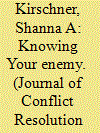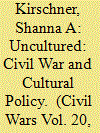| Srl | Item |
| 1 |
ID:
100285


|
|
|
|
|
| Publication |
2010.
|
| Summary/Abstract |
When do civil wars last especially long? Commitment problems can stymie conflict resolution but they are not homogeneous across all civil wars. Indeed, combatants' perceptions of their adversaries significantly affect the severity of commitment problems. Intergroup interactions provide combatants with one crucial type of information about their adversaries and about the risks associated with signing a peace settlement, shaping strategic decisions. The argument is tested against a new data set of all ethnic civil wars between 1945 and 2004. The results demonstrate that intergroup interactions prolong wars when they indicate that a peace deal will be especially fragile or that the costs of it breaking down will be especially high. This is true, regardless of the combatants' goals or their capabilities. In sum, information shapes perceptions and the severity of commitment problems, in turn affecting the duration of civil wars.
|
|
|
|
|
|
|
|
|
|
|
|
|
|
|
|
| 2 |
ID:
103120


|
|
|
|
|
| Publication |
2009.
|
| Summary/Abstract |
This article seeks to engage scholars in a richer understanding of post-civil war settlement implementation. It examines why some parties execute the provisions of these agreements fairly extensively, whereas others abide by few, if any, dimensions. We explore four peace settlements, developing a new measure that gauges various aspects of implementation. We examine how two factors in particular affect the degree to which parties abide by their commitments. First, we find that implementation is more likely as international support increases. This occurs through three chief mechanisms: mitigating commitment problems, generating audience costs, and the contingency of aid on implementation. Second, the balance of capabilities is a significant domestic influence on implementation. Parties are most prone to abide when the government is militarily superior, but the former rebels are powerful enough to meaningfully check government action. Implementation is less successful when government capabilities far exceed those of the rebels or when the rebels are particularly strong.
|
|
|
|
|
|
|
|
|
|
|
|
|
|
|
|
| 3 |
ID:
116478


|
|
|
|
|
| Publication |
2012.
|
| Summary/Abstract |
Students in courses about the Middle East want to learn, and they crave discussion. Yet they enter the classroom with a set of beliefs about the region that interact with their fears of offending or contradicting their peers. Together, these can produce a classroom dynamic that ultimately stymies student learning. In this article, several strategies are described to ameliorate this concern. These range from short lessons that directly confront student biases about the Middle East, to close analysis of journal articles and empirical evidence, to structured debates and simulations, to specific classroom management techniques. Together, these strategies can promote engaged, lively debate; generate student self-awareness of their presuppositions; and enhance learning.
|
|
|
|
|
|
|
|
|
|
|
|
|
|
|
|
| 4 |
ID:
160364


|
|
|
|
|
| Summary/Abstract |
How does cultural policy affect violence? While cultural discrimination is frequently cited as a potential grievance motivating political violence, the relationship remains under-theorised and largely untested. I weave theoretical literatures with interviews and secondary sources on the experience of Kurds in Turkey to understand the socio-economic and psychological pathways through which cultural policies impact intrastate conflict. I then analyse cross-national data on political violence, demonstrating that cultural grievances increase support for violence, raise the chance and severity of conflict and prolong violent conflicts. In short, policy matters: cultural restrictions exacerbate violence through multiple pathways.
|
|
|
|
|
|
|
|
|
|
|
|
|
|
|
|